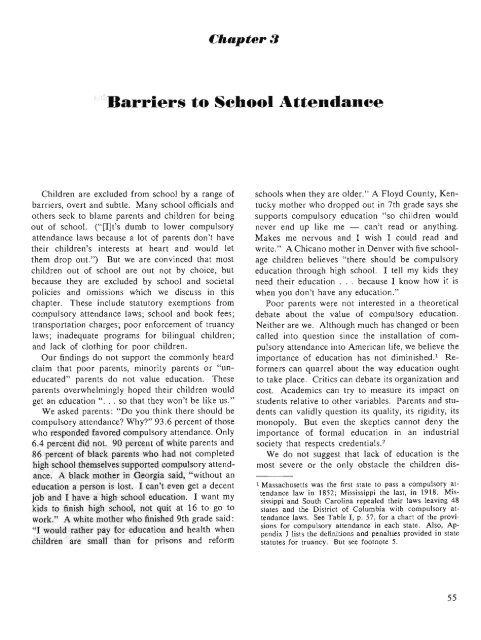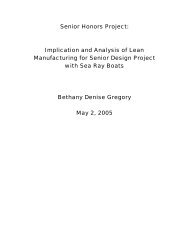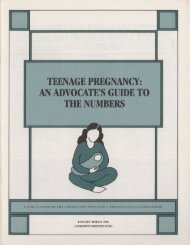children out of school in america - University of Tennessee Digital ...
children out of school in america - University of Tennessee Digital ...
children out of school in america - University of Tennessee Digital ...
You also want an ePaper? Increase the reach of your titles
YUMPU automatically turns print PDFs into web optimized ePapers that Google loves.
Chapter 3<br />
Barriers to School Attendance<br />
Children are excluded from <strong>school</strong> by a range <strong>of</strong><br />
barriers, overt and subtle. Many <strong>school</strong> <strong>of</strong>ficials and<br />
others seek to blame parents and <strong>children</strong> for be<strong>in</strong>g<br />
<strong>out</strong> <strong>of</strong> <strong>school</strong>. ("[I]t's dumb to lower compulsory<br />
attendance laws because a lot <strong>of</strong> parents don't have<br />
their <strong>children</strong>'s <strong>in</strong>terests at heart and would let<br />
them drop <strong>out</strong>.") But we are conv<strong>in</strong>ced that most<br />
<strong>children</strong> <strong>out</strong> <strong>of</strong> <strong>school</strong> are <strong>out</strong> not by choice, but<br />
because they are excluded by <strong>school</strong> and societal<br />
policies and omissions which we discuss <strong>in</strong> this<br />
chapter. These <strong>in</strong>clude statutory exemptions from<br />
compulsory attendance laws; <strong>school</strong> and book fees;<br />
transportation charges; poor enforcement <strong>of</strong> truancy<br />
laws; <strong>in</strong>adequate programs for bil<strong>in</strong>gual <strong>children</strong>;<br />
and lack <strong>of</strong> cloth<strong>in</strong>g for poor <strong>children</strong>.<br />
Our f<strong>in</strong>d<strong>in</strong>gs do not support the commonly heard<br />
claim that poor parents, m<strong>in</strong>ority parents or "uneducated"<br />
parents do not value education. These<br />
parents overwhelm<strong>in</strong>gly hoped their <strong>children</strong> would<br />
get an education "... so that they won't be like us."<br />
We asked parents: "Do you th<strong>in</strong>k there should be<br />
compulsory attendance? Why?" 93.6 percent <strong>of</strong> those<br />
who responded favored compulsory attendance. Only<br />
6.4 percent did not. 90 percent <strong>of</strong> white parents and<br />
86 percent <strong>of</strong> black parents who had not completed<br />
high <strong>school</strong> themselves supported compulsory attendance.<br />
A black mother <strong>in</strong> Georgia said, "with<strong>out</strong> an<br />
education a person is lost. I can't even get a decent<br />
job and I have a high <strong>school</strong> education. I want my<br />
kids to f<strong>in</strong>ish high <strong>school</strong>, not quit at 16 to go to<br />
work." A white mother who f<strong>in</strong>ished 9th grade said:<br />
"I would rather pay for education and health when<br />
<strong>children</strong> are small than for prisons and reform<br />
<strong>school</strong>s when they are older." A Floyd County, Kentucky<br />
mother who dropped <strong>out</strong> <strong>in</strong> 7th grade says she<br />
supports compulsory education "so <strong>children</strong> would<br />
never end up like me - can't read or anyth<strong>in</strong>g.<br />
Makes me nervous and I wish I could read and<br />
write." A Chicano mother <strong>in</strong> Denver with five <strong>school</strong>age<br />
<strong>children</strong> believes "there should be compulsory<br />
education through high <strong>school</strong>. I tell my kids they<br />
need their education ... because I know how it is<br />
when you don't have any education."<br />
Poor parents were not <strong>in</strong>terested <strong>in</strong> a theoretical<br />
debate ab<strong>out</strong> the value <strong>of</strong> compulsory education.<br />
Neither are we. Although much has changed or been<br />
called <strong>in</strong>to question s<strong>in</strong>ce the <strong>in</strong>stallation <strong>of</strong> compulsory<br />
attendance <strong>in</strong>to American life, we believe the<br />
importance <strong>of</strong> education has not dim<strong>in</strong>ished.' Reformers<br />
can quarrel ab<strong>out</strong> the way education ought<br />
to take place. Critics can debate its organization and<br />
cost. Academics can try to measure its impact on<br />
students relative to other variables. Parents and students<br />
can vaHdly question its quality, its rigidity, its<br />
monopoly. But even the skeptics cannot deny the<br />
importance <strong>of</strong> formal education <strong>in</strong> an <strong>in</strong>dustrial<br />
society that respects credentials. 2<br />
We do not suggest that lack <strong>of</strong> education is the<br />
most severe or the only obstacle the <strong>children</strong> dis-<br />
1 Massachusetts was the first state to pass a compulsory attendance<br />
law <strong>in</strong> 1852; Mississippi the last, <strong>in</strong> 1918. Mississippi<br />
and S<strong>out</strong>h Carol<strong>in</strong>a repealed their laws leav<strong>in</strong>g 48<br />
states and the District <strong>of</strong> Columbia with compulsory attendance<br />
laws. See Table I, p. 57, for a chart <strong>of</strong> the provisions<br />
for compulsory attendance <strong>in</strong> each state. Also, Appendix<br />
J lists the def<strong>in</strong>itions and penalties provided <strong>in</strong> state<br />
statutes for truancy. But see footnote 5.<br />
55














